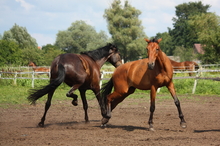In as little as one week, horses receiving Vitamin E Pellets by SmartPak, which contain a ânaturalâ form of Vitamin E, had significantly higher amounts of vitamin E in their blood as compared to horses in a control group.

Vitamin E keeping horses active and healthy
For optimum muscular and neurological health, dietary vitamin E is a critical component to your horseâs own antioxidant defense systems, says Dr. Lydia Gray, SmartPakâs Staff Veterinarian/Medical Director and primary investigator.
Vitamin E is recognized as a powerful antioxidant that is important for maintaining normal muscle and nervous system health and function. When it comes to measuring Vitamin E levels in the blood, the research also demonstrated that sample handling is critical, and when established protocols are followed the results are representative.
âFor optimum muscular and neurological health, dietary vitamin E is a critical component to your horseâs own antioxidant defense systems,â says Dr. Lydia Gray, SmartPakâs Staff Veterinarian/Medical Director and primary investigator. âThrough this 14-day study, we were able to conclusively show that our ânaturalâ vitamin E supplement is well-absorbed by horses, rapidly reaching recommended levels in the body.â
Vitamin E Pellets by SmartPak contain the ânaturalâ or d-alpha tocopherol version of the nutrient, which is more biologically active in the body than the synthetic version. The National Research Council (NRC) recommends that normal, healthy adult horses receive 1-2 IU/kg body weight (International Units per kilogram), which is equivalent to 1000 to 2000 IU for an 1100 pound horse.
However, veterinarians often suggest that horses with muscle or neurological issues be supplemented with higher levels.
The study was conducted using client-owned horses and ponies of various ages and breeds from a therapeutic riding center in consultation with the Animal Health Diagnostic Center at Cornell University College of Veterinary Medicine.
âHaving expert advice on the proper collection, handling, and transport of blood samples was critical to the success of this study,â says Dr. Gray. âOther studies had documented that the wrong type of tube, exposing the blood sample to light, letting it get too warm, or repeated freeze/thaw cycles can all damage vitamin E in blood samplesâresulting in falsely low levels--so we wanted to be sure and avoid those known negative effects.â
To learn more about the Vitamin E research study, visit www.SmartPak.com/VitEResearch.
About SmartPak
From the feed room to the tack room, SmartPak offers innovative solutions to help riders take great care of their horses. SmartPak was founded in 1999 with the introduction of the patented SmartPak supplement feeding system. The revolutionary, daily dose SmartPaks are custom-made for your horse, individually labeled and sealed for freshness.
With the success of this simple and convenient feeding system, SmartPak has continued to expand its offering of quality products, including its own line of more than 55 supplement formulas called SmartSupplements, and a wide variety of tack, equipment, and supplies.
The company has grown rapidly each year and is now the largest retailer of equestrian products in the United States. SmartPakâs success has been powered by a passion for delivering an unbeatable customer experience, and the company has been recognized with a Bizrate Circle of Excellence award five years in a row, as well as receiving an âEliteâ rating from STELLAService. A nine-time Inc. 500/5000 honoree, SmartPak is the only equine company ever named to the Inc. 500 list.
